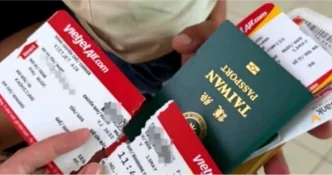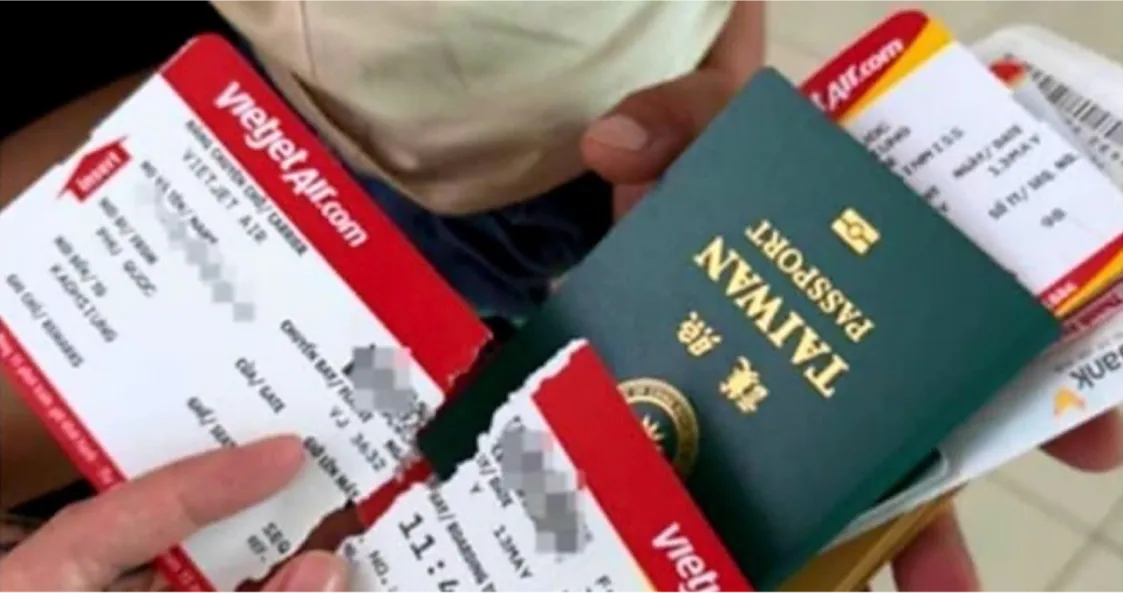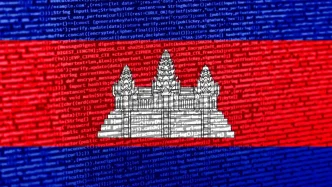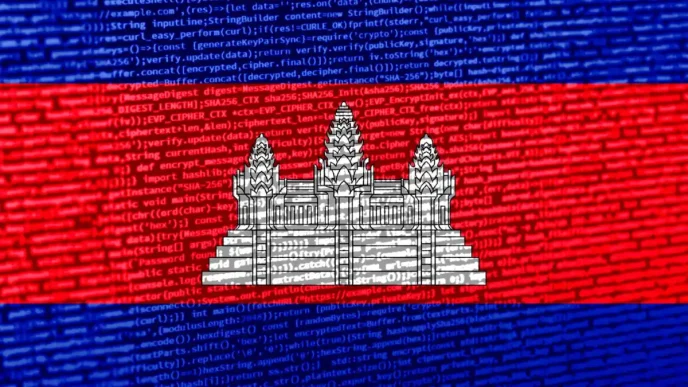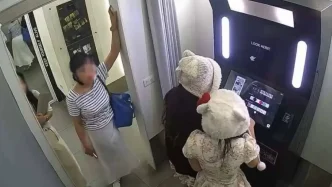A seemingly routine exit procedure at Phú Quốc International Airport in southern Vietnam spiraled into a public controversy last week when an immigration officer allegedly tore a passenger’s boarding pass during a heated exchange. The incident, involving a family of four from Taiwan, has led to the temporary suspension of the officer involved and sparked broader discussions about professional conduct and language barriers at Vietnam’s border control points. As the investigation unfolds, questions remain about how such interactions can be better managed to prevent future escalations.
Details of the Incident
On May 13, 2025, a family of four from Taiwan was processing their exit documents at Phú Quốc International Airport to return to Kaohsiung after a holiday on the popular resort island. According to official statements from Vietnam’s Immigration Department under the Ministry of Public Security, the incident began during a routine verification of passports. The officer reportedly requested the family to present their documents individually, a standard procedure when children are included in a group.
However, tensions arose when the passengers allegedly refused to comply and displayed what authorities described as “inappropriate behavior.” A significant language barrier compounded the situation, with the family speaking Chinese and the officer communicating in English. Amid the confusion, the officer, believing he was being insulted, lost his temper and tore one of the boarding passes—specifically that of a child, as later shared by the passenger in posts on social media platforms like X.
The passenger, a mother traveling with her husband and two children, detailed her perspective online in Chinese. She recounted being instructed to line up in pairs at the counter, only to be told to move to the back of another line without clear explanation. Confused, she sought clarification in Chinese, speaking to both the officer and her husband. She speculated that her tone or volume might have been misinterpreted as yelling, escalating the officer’s frustration. After being ignored while other passengers were processed, she approached the counter again to request assistance, at which point the officer tore the boarding pass in half.
Immediate Response and Official Actions
Following the incident, senior officials at Phú Quốc’s airport border police quickly intervened. A replacement officer was assigned to assist the family, who were able to reprint their boarding pass and complete the exit procedures without further delay. The Immigration Department confirmed on May 19, 2025, that the officer involved has been temporarily suspended to allow for a thorough investigation into the matter. Disciplinary measures, in line with the Ministry of Public Security’s internal regulations, are expected to follow pending the investigation’s outcome.
In an additional development shared by the passenger on social media, a local tour guide informed her that Vietnam’s customs authorities had reached out to the travel agency involved to offer an apology. While this gesture suggests an intent to address the family’s grievance, no official public apology has been issued by the Immigration Department as of the latest updates.
Public Reaction and Broader Implications
The incident has captured significant attention both in Vietnam and Taiwan, fueled by the passenger’s social media posts and subsequent media coverage. Many online commentators in Vietnam have expressed concern over the professionalism of border control staff, with some calling for better training in cultural sensitivity and conflict de-escalation. On X, users have highlighted the challenges of language barriers at international airports, with one post reading, “Language issues are no excuse for unprofessional behavior—Vietnam’s tourism image is at stake.”
In Taiwan, the story has resonated as an example of the challenges faced by travelers abroad, prompting discussions about how tourists can better prepare for such interactions. Local media outlets have reported on the family’s ordeal, with some questioning whether Vietnam’s border authorities are equipped to handle the growing influx of international visitors to destinations like Phú Quốc, a burgeoning hub for tourism in Southeast Asia.
Beyond the immediate incident, the case has reignited debates about service standards at Vietnam’s points of entry. Phú Quốc, often marketed as Vietnam’s “Pearl Island,” attracts millions of visitors annually, including a significant number from Taiwan and other East Asian countries. Incidents like this risk tarnishing the island’s reputation as a welcoming destination, particularly at a time when Vietnam is actively promoting tourism as a key economic driver post-pandemic.
Language Barriers and Systemic Challenges
Language barriers are a recurring issue at international airports across Southeast Asia, where staff often interact with passengers from diverse linguistic backgrounds. In Vietnam, while English is widely taught and used in tourist-facing roles, proficiency levels vary, and other languages such as Chinese are less commonly spoken by border officials. This can lead to misunderstandings, as appears to have happened in this case, where the passenger’s attempts to seek clarification in Chinese may have been misread as confrontational.
Experts in tourism and cross-cultural communication suggest that such incidents highlight the need for targeted training. Dr. Linh Tran, a Hanoi-based sociologist specializing in tourism studies, noted, “Border control officers are often the first point of contact for international visitors. Equipping them with basic phrases in key languages like Mandarin, or even providing translation tools, could prevent these misunderstandings.” She also emphasized the importance of de-escalation training to manage high-stress interactions, particularly in busy environments like airports.
Additionally, systemic pressures on immigration staff—such as understaffing during peak travel seasons or strict procedural mandates—may contribute to such lapses in judgment. While the Immigration Department has not commented on specific staffing challenges at Phú Quốc, reports from local media suggest that the airport has struggled to keep pace with the rapid increase in tourist arrivals, with long queues and processing delays a common complaint among travelers.
Tourism and Vietnam’s International Image
Vietnam’s tourism sector has seen remarkable growth in recent years, with the country welcoming over 18 million international visitors in 2024, according to data from the Vietnam National Administration of Tourism. Phú Quốc alone accounted for a significant portion of these arrivals, bolstered by direct flights from cities like Taipei and Seoul. The government has set ambitious targets to attract 25 million foreign tourists by 2030, with initiatives to streamline visa processes and enhance infrastructure at key entry points.
However, incidents like the one at Phú Quốc could undermine these efforts if not addressed transparently. Negative experiences shared on social media can spread rapidly, influencing potential visitors’ perceptions. A 2023 survey by the Asia-Pacific Travel Association found that over 60% of travelers in the region consider online reviews and personal accounts when choosing destinations, underscoring the impact of such public controversies.
The Vietnamese government has previously taken steps to improve service quality in the tourism sector, including mandatory training programs for hospitality and border staff. In 2022, the Ministry of Culture, Sports, and Tourism launched a campaign titled “Vietnamese Smile” to promote friendliness and professionalism among service workers. Whether these initiatives will extend to immigration officers in light of recent events remains to be seen.
Looking Ahead: Reforms and Resolutions
As the investigation into the Phú Quốc incident continues, the focus is likely to shift toward actionable reforms. Public calls for accountability are growing, with many advocating for clearer guidelines on officer conduct and better resources to handle multilingual interactions. If confirmed, the officer’s actions could lead to stricter disciplinary precedents within the Ministry of Public Security, signaling a zero-tolerance approach to unprofessional behavior.
For the affected family, the incident may leave a lasting impression of their time in Vietnam, though the reported apology via the travel agency offers a glimmer of reconciliation. Meanwhile, travelers and authorities alike are left to ponder how small misunderstandings can escalate—and what can be done to ensure that Vietnam’s gateways remain as inviting as its landscapes. As one X user poignantly asked, “Isn’t a torn boarding pass a torn first impression?”

